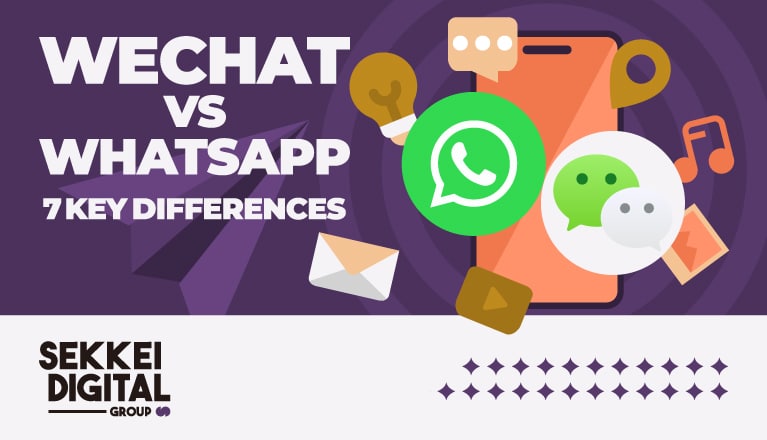Two of the most popular messaging apps many global business owners may have already heard about are WhatsApp and WeChat. These two apps look similar at first glance, but when you utilize them as business tools, their differences often arise.
It’s worth noting that, like Facebook Messenger, WhatsApp has been restricted in the Chinese tech industry since 2017. However, during its heyday in the Chinese market, it has attracted many local users.
In this WeChat vs. WhatsApp comparison, we aim to familiarize foreign brands with the Chinese digital landscape and provide insights into how users utilize these local messaging applications.
What is WeChat Used For?
WeChat started as a Chinese messaging app. Over time, it has become a versatile platform that goes beyond just sending messages or making calls.
Right now, this super app features a wide range of functions for business communication, from WeChat Pay services and in-app games to social media and online shopping channels. This versatility has led the platform to garner a massive market size of 1.3 billion monthly active users.
According to recent statistics, WeChat users send around 45 billion text and voice messages per day. The sheer amount of usage it has today has secured its place as the number one instant messaging app in China.
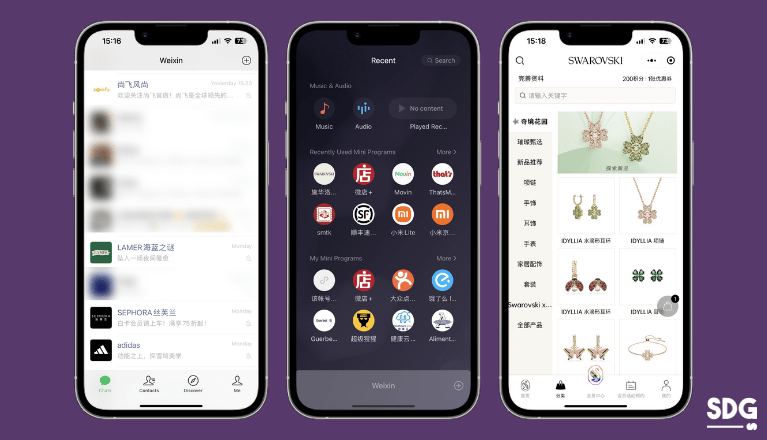
With a WeChat business account, marketers can customize their brand pages to enhance customer experience on the platform.
WeChat business accounts can customize their brand pages to enhance customer experience in the platform. While it’s free to send text messages or make video calls in the app, utilizing their built-in payment services and other features like advertising comes with a price.
What is WhatsApp Used For?
On the other hand, WhatsApp is undoubtedly the most popular mobile messaging app in the world. It has approximately 2.7 billion monthly active users that mainly utilize the platform for sending text messages, creating group chats, file sharing, or making voice and video calls.
WhatsApp Messenger was launched as a paid app exclusively for iPhone users. However, as it surpasses other apps in the global market, making a WhatsApp account has eventually become free of charge.
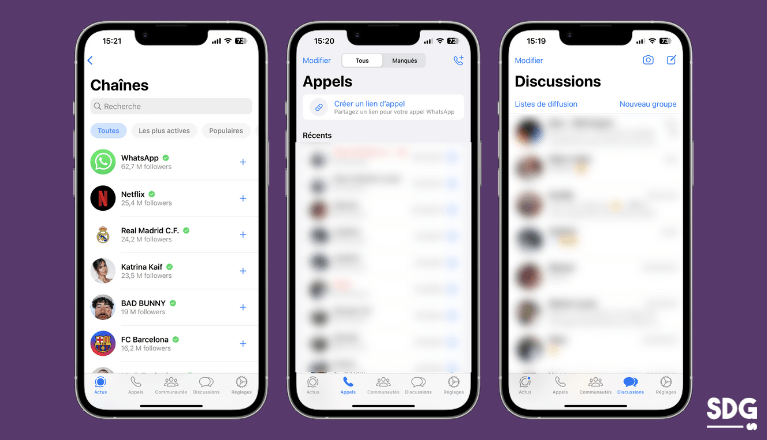
Like WeChat, companies can also access the WhatsApp Business API to communicate with their target audience directly. The business version also allows brands to own a company profile within the app further to assert their credibility and visibility in the market.
What are the similarities between WeChat and WhatsApp?
Both WeChat and WhatsApp offer instant messaging, voice and video calls, and group chat functionalities that cater to the basic need for real-time communication.
These messaging apps allow sharing of documents and multimedia files like images, videos, and voice notes. Downloading both apps and using these basic features is free as long as users can access an internet connection. You can register on these platforms using a mobile number or scanning a QR code.
They also cater to businesses, allowing users to create their brand accounts with exclusive features that they can use to amplify marketing strategies and customer services.
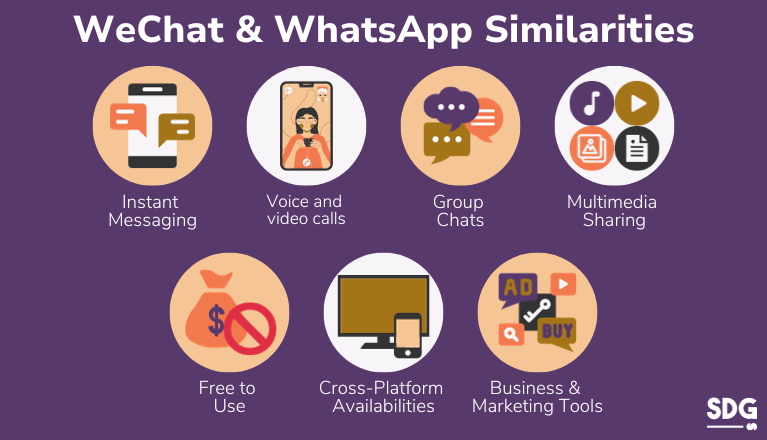
Despite the similarities discussed above, WeChat offers a much more expansive range of services, particularly in China. It serves as a platform for payments, social networking, and an array of other lifestyle services, which is a stark contrast to WhatsApp features that are more focused on messaging and calling services. Read along as we discuss them in detail below.
What is the difference between WeChat and WhatsApp?
1. Target Market and User Demographics
One of the reasons why WhatsApp and WeChat features greatly vary is the fact that they cater to different target markets and user demographics.
Due to the Great Firewall policy, WhatsApp is not one of the messaging apps Chinese users can utilize in their daily communication needs. However, as mentioned earlier, the platform has garnered over 2 million users before it was banned in 2017.
Although local users can still use this instant messaging app using a virtual private network (VPN), it has very little presence in China. Its user base is mostly from India, Brazil, Indonesia, and the United States.
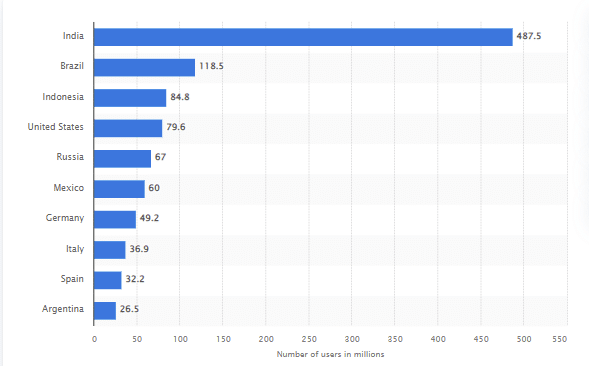
Global WhatsApp users in selected countries 2021 (Source: Statista)
Meanwhile, WeChat users are predominantly from China. Given its massive local user base, it’s not a surprise that most of its features (from user interface to payment integration) are aligned with the cultural nuances and preferences of the Chinese market.
If you look at the user demographics below, the usage distribution across all age groups appears more balanced than other platforms. This audience versatility is a huge part of why this super app is widely regarded as an effective digital marketing tool.
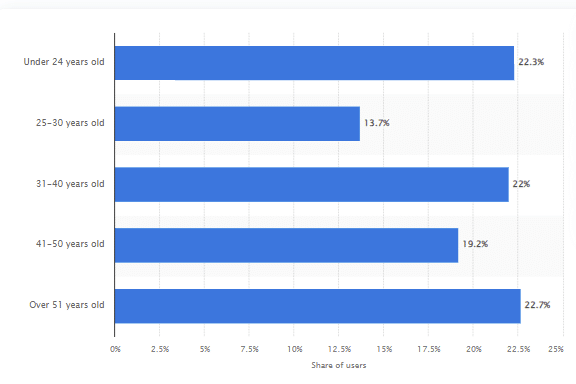
WeChat user age distribution 2022 (Source: Statista)
2. Supported Languages
As one of the most downloaded messaging apps in the world, it’s only natural for WhatsApp Messenger to have an extensive language support feature. Besides English, the platform enables users to change the app interface to 40 languages on iPhone and 60 on Android.
If we’re being honest, you don’t need a detailed comparison to see that WeChat is specifically designed for Chinese consumers. Why? Because its user interface does not have that many language options.
At most, it supports approximately 20 languages. However, given its local user base, the app prioritizes the use of Traditional and Simplified Chinese.
Nevertheless, businesses can take advantage of this configuration, especially if a foreign brand intends to utilize this messaging app as part of their local digital marketing campaigns.
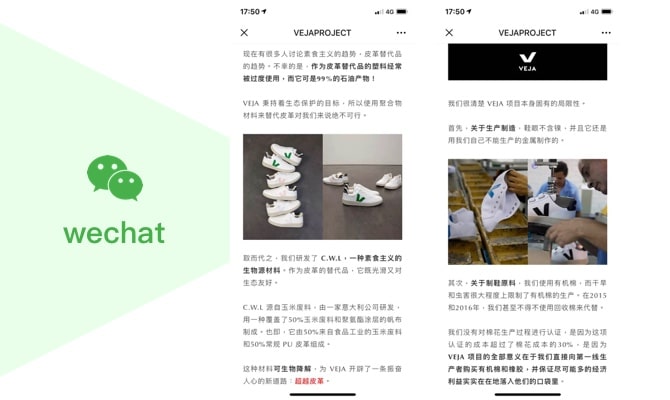
SDG’s work with Veja: WeChat Content Localization
The language setting enables users to change the interface and navigate the app better, but remember that most local consumers you’ll interact with are still Chinese speakers. To reach the right audience, you must localize your brand and all the marketing strategies you intend to execute on the platform.
If not, chances are your intended audience won’t be able to find or engage with your content within the app.
3. Business Features
Once you subscribe to Whatsapp Business API, you’ll have the ability to customize your brand profile within the app, create product catalogs, and set up automated messages to respond to other users.
And while all that does elevate customer experience, WeChat obviously took it a step further through its social commerce integration. Thanks to this feature, businesses can set up online stores where users can browse products and make purchases without leaving the app.
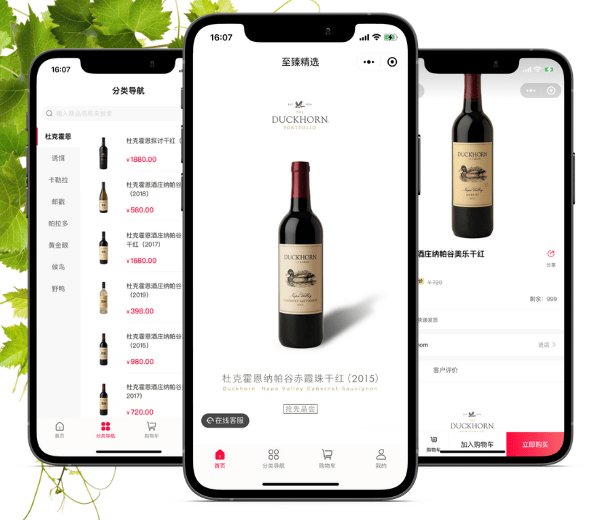
SDG’s work with Duckhorn: WeChat Store Set-Up
You may not know, but brands with Official WeChat Accounts are also capable of developing sub-applications called Mini Programs. Besides launching a virtual storefront through this feature, marketers can use these apps for task management and customer service.
On top of that, did you know that the platform has targeted advertising formats? If utilized properly, businesses can easily reach potential customers based on their interests and behaviors.
Depending on the company’s needs and budget allocations, advertisers can pick between WeChat Moments Ads, Channel Ads, Search Ads, Public Account Ads, and Mini Program Ads.
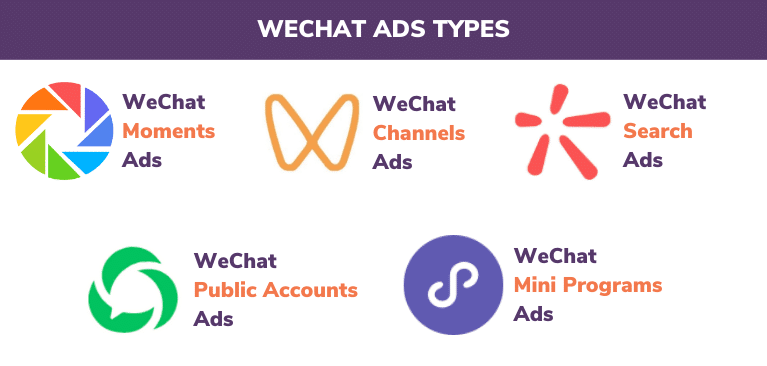
As you can see, these e-commerce and advertising features are seemingly absent on WhatsApp Business API. It’s evident that WeChat offers more value in business integration than its Western alternative.
4. Privacy and Security
All the data sent through WhatsApp, from text messaging to media and audio recordings, are protected by end-to-end encryption technology. It means that the content is encrypted on the senders’ mobile phones and can only be decrypted by the recipient’s device.
This protocol ensures that even WhatsApp and its parent company, Meta (formerly Facebook), cannot access the content of the communications. WhatsApp’s end-to-end encryption is based on the Signal Protocol, which is highly regarded in the cybersecurity community.
WeChat’s approach to privacy and security is remarkably different, largely due to its origin and primary user base in China. It’s also because government regulations require all companies to provide access to user data when requested.
So, instead of end-to-end encryption, it uses client-to-server encryption. Through this security feature, WeChat conversations are encrypted during transmission but can be accessed on the servers.
Tencent, the company that owns the app, can monitor accounts for content prohibited by Chinese laws and has been known to share user data with the local government.
5. Payment Integration
WeChat Pay and WhatsApp Pay are in-app services that allow users to manage their online financial transactions directly from their mobile devices. This feature may seem like more of a similarity, but they operate in different ways and markets.
WeChatPay is one of the two dominant mobile payment services in China, alongside Alipay. It allows users to perform a wide array of financial transactions including, but not limited to:
- Transfers between WeChat friends
- Mobile phone top-ups
- Online and offline shopping payments
- Utility bill payments
- Public transportation fares
- Ordering food and services
- Receiving money from QR code transactions
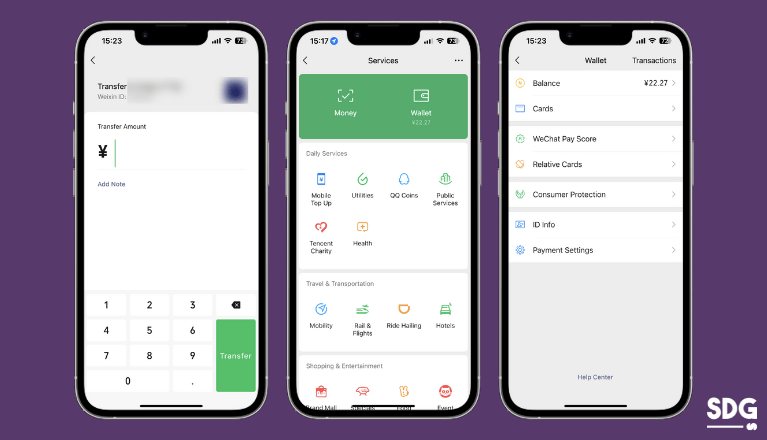
The platform has also been expanding internationally, allowing Chinese tourists to manage their payments within the app when on an overseas trip.
Meanwhile, WhatsApp Pay is designed to simplify peer-to-peer money transfers, much like when you send messages. It operates with a real-time payment system that allows transactions between parties’ bank accounts. Here are some of its features:
- Linking to users’ bank accounts via UPI
- Sending and receiving money from contacts within the WhatsApp chat interface
- Performing quick transactions without leaving the app
- Securing transactions with a UPI PIN for transaction authorization
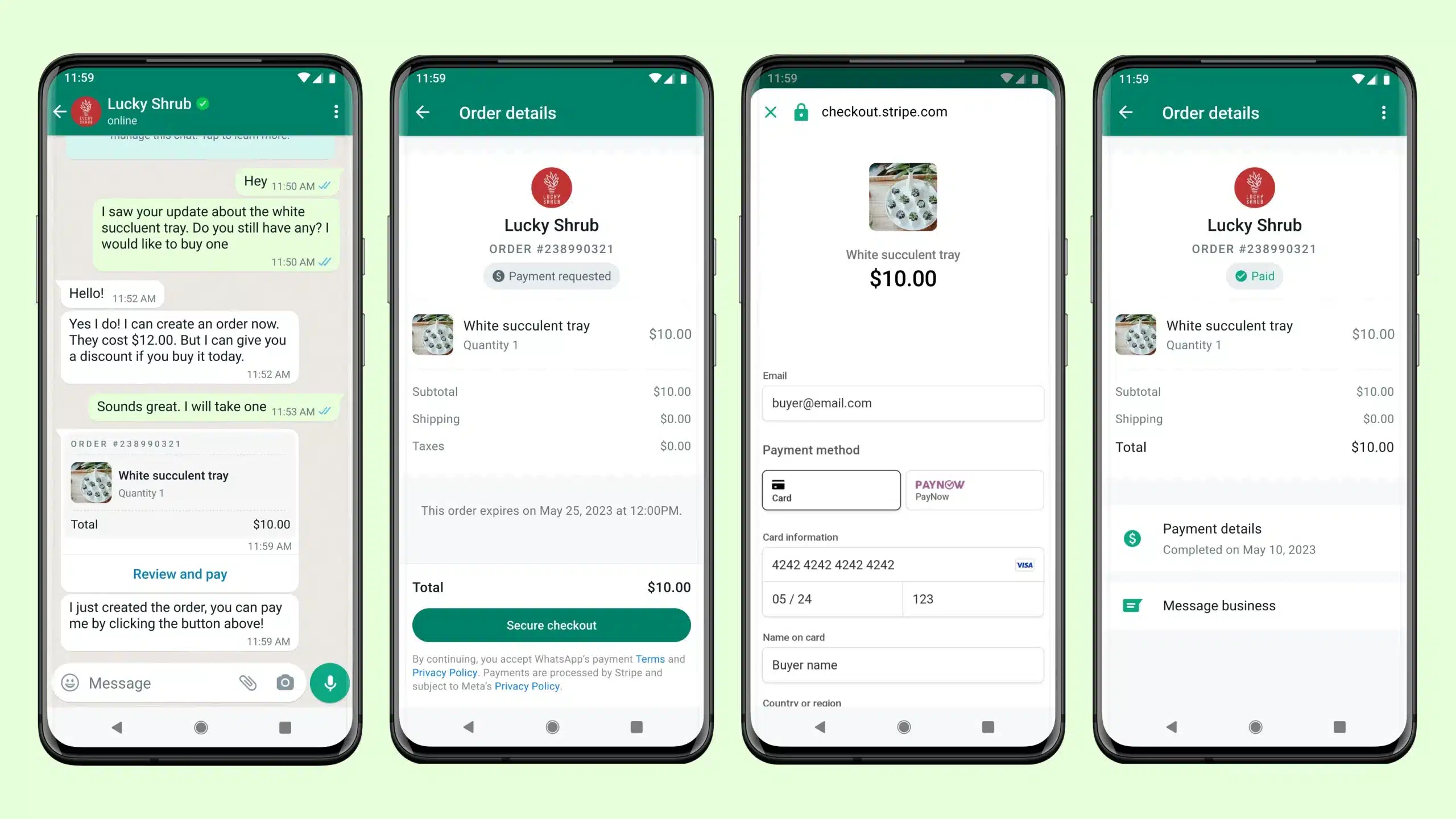
Source: WhatsApp
6. Additional Features
One of the most notable additional features you can find in WeChat is its integrated search engine. Through WeChat Search features, your target audience can find you easily as long as your content and listings are optimized with industry-related keywords.
As you know, Chinese consumers are savvy and curious shoppers. So, expect them to search high and low for anything about your brand. Applying SEO strategies to your WeChat content also translates to a better customer experience.
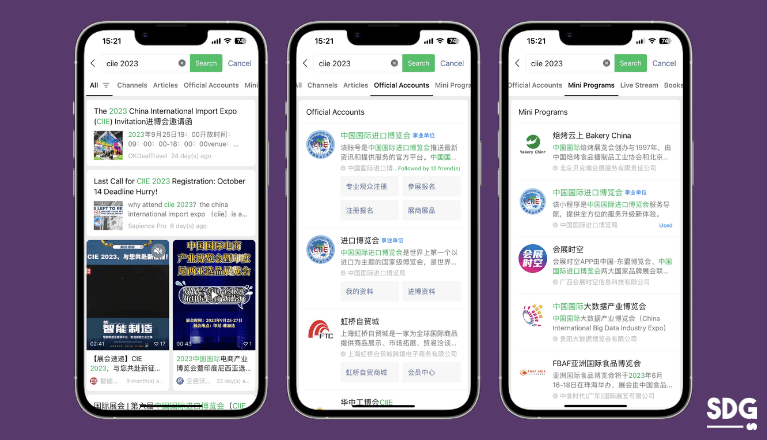
In contrast, the search function in WhatsApp Business API only accommodates finding a keyword within a text message, contact, or shared media across the app.
WeChat’s search capability is more comprehensive, especially because it extends user queries to articles and news shared on Moments and even within Mini Programs.
WeChat vs. WhatsApp: How To Choose Between the Two Messaging Apps?
● Define Your Business Needs
When weighing the perks of WeChat vs. WhatsApp, the first thing you must consider is your target consumer base and location.
For businesses aiming to enter the Chinese market, choosing WeChat over WhatsApp is the most sensible solution, given the limited availability of the Western app in the region.
● Determine Its Compatibility with Other Tools
A messaging app with a user-friendly interface will be useless if you can’t integrate it with other business processes. In WeChat’s case, it’s easy to do this because the platform already has a full ecosystem, including social media and e-commerce channels.
It also enables businesses to integrate Customer Relationship Management tools, helping them to track interactions with customers and manage relationships more effectively.
● Consider the Expenses
Although WeChat and WhatsApp registration are free, a lot of their business features do cost money. For the latter, it’ll range from $35 for a regular business account to $300 for an enterprise subscription.
In WeChat, foreign companies must pay verification fees of $99 monthly. If you want to use its advertising tools, the expenses will depend on the promotional campaign’s duration, target options, and format.
Quick Q&A
Why do so many Chinese use WeChat?
WeChat’s multifunctional platform, deeply integrated into daily life in China, offering messaging, social media, payments, and a variety of life services all in one app, drives its widespread use among Chinese users.
What is unique about WeChat?
WeChat’s uniqueness lies in its ‘super app’ status, combining communication, social networking, e-commerce, and financial services, along with an extensive range of mini-programs that negate the need for multiple apps.
Your WeChat Marketing Partner in the Chinese Market!
This WhatsApp vs. WeChat comparison highlights the deep integration of technology into the daily habits of modern consumers. With WhatsApp restricted in the local business scene, WeChat has become an indispensable tool for brands looking to tap into the Chinese market.
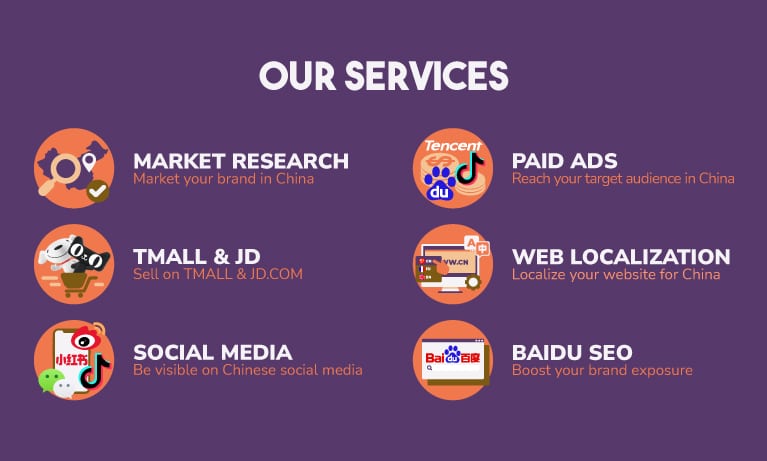
For a brand eyeing success in China, WeChat is not just a choice but a necessity. At Sekkei Digital Group, we understand the subtleties inherent to this local platform – including consumer behaviors and the ever-evolving trends that shape it.
If you want to get deeper insights into marketing on WeChat or you have any questions on how to set up your brand’s account, don’t hesitate to contact us today!
References:
WeChat vs. WhatsApp: how to choose the best for your business
WhatsApp vs WeChat – Which is Best and Has the Most Features, Privacy, and Security
WeChat vs. WhatsApp: Which Messaging App Should You Use for Customer Service?

